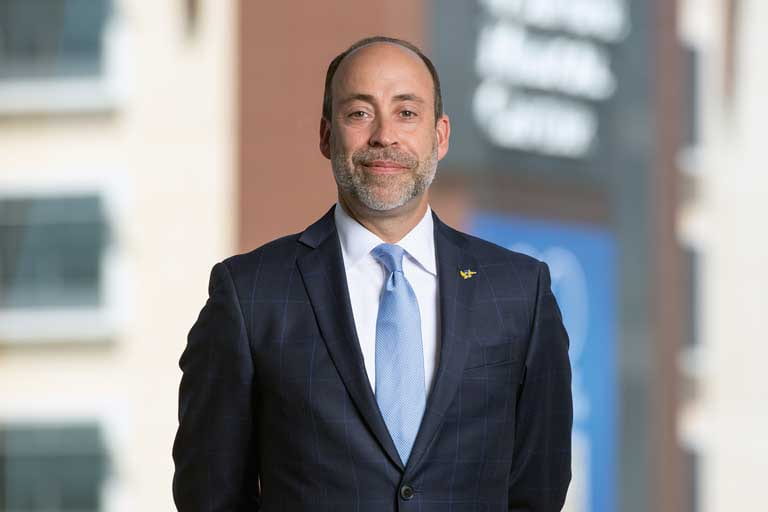Lifting Prisoners Into a Brighter Future
UCI launches the UC system’s first B.A. program for incarcerated individuals
Keramet Reiter’s interest in prison education began when she was an undergrad at Harvard University, participating in and eventually managing a program to help convicts earn a GED diploma. She then taught in a private college’s A.A. degree program inside San Quentin State Prison from 2007 to 2012, while attaining a law degree and a doctorate in jurisprudence & social policy at UC Berkeley. So after joining the UCI faculty in 2012, Reiter naturally fell into informal discussions with colleagues who shared her interest.
“We began talking about the need for a B.A. program in prisons,” she says, “and because many of us who study prisons think about maybe doing something, we started putting the building blocks in place to make it happen.” Those blocks took concrete form in December, when UCI Chancellor Howard Gillman signed a memorandum of understanding with the California Department of Corrections and Rehabilitation for UCI to create the University of California system’s first in-prison Bachelor of Arts program: Leveraging Inspiring Futures Through Educational Degrees.
Classes are expected to commence in fall 2022 at the Richard J. Donovan Correctional Facility in San Diego County.
Reiter, an associate professor of criminology, law & society as well as law, had three UCI co-instigators in shaping the program who now join her on the initiative’s core team: Valerie Jenness, acting vice provost for academic planning, Distinguished Professor of criminology, law & society and former dean of social ecology; Carroll Seron, professor emerita of criminology, law & society; and Pavan Kadandale, associate professor of teaching in molecular biology & biochemistry. There’s a 59-member advisory committee drawn from schools across campus.
Reiter knew they had something when the group presented the idea to Gillman. “I vividly remember his excitement when we first met with him to talk about this,” she says. “It was really key to have Chancellor Gillman on board so officials in the prison system would know that it wasn’t just a group of faculty calling but that it would be the institution they were partnering with.”
View also: UCI Podcast: New in-prison bachelor’s degree to transform lives
The chancellor’s commitment was evident during an online press conference in December announcing the memorandum about Leveraging Inspiring Futures Through Educational Degrees, at which he said, “Providing a UC education to students in state prison will help us make good on our promise to provide a high-quality education to Californians, regardless of their circumstances. LIFTED will transform lives for those in prison in ways that higher education already does for millions of students.”
There has been similar enthusiasm from UCI faculty, with so many volunteering to teach courses that Reiter says: “As much as I would love to be one of them, I’ll probably just play a mentorship role at first, because I don’t want to deny any of them experiencing the level of gratitude and engagement that prisoners almost uniformly show for a college education.”
“The experience provides convicts with the
critical thinking skills to navigate life, and
that’s the most important thing when they
get out and are faced with life’s challenges.”
The initial degree offered will be in sociology, in part because it’s a large department with a range of electives, but mainly for what Reiter calls structural reasons: The community college working in the Donovan facility – Southwestern College in Chula Vista – offers an A.A. there in sociology. Southwestern has a transfer program with UCI, which simplifies the bureaucracy involved.
To transfer to UCI’s program, inmates must first have their A.A., maintain a 3.5 GPA and meet other qualifications. It’s anticipated that some 25 students in Southwestern’s program will transfer to UCI’s B.A. program, with the prospect of graduating in 2024.
“We’re viewing the sociology B.A. as a proof-of-concept project,” Reiter says, “to show that if this is possible for one group, then it will be readily replicable across other degrees and other UC campuses.”
The timing for the program is propitious. Since 2014, the state has funded community college programs that offer A.A. degrees in correctional facilities. A few state universities have developed B.A. programs as well.
LIFTED also aligns with the recent national focus on prison reform and with federal Pell Grants again being made available to the incarcerated. And it doesn’t hurt that there’s a move to allow prisoners greater access to technology.
Brant Choate, director of rehabilitative programs in California’s Department of Corrections and Rehabilitation, is one of the officials working with UCI on the LIFTED project. Regarding access to technology, he says: “Even back in 2014, community colleges were putting all their courseware online, and students submitted assignments online. But when they came into the prisons, I essentially told them, ‘Your students here only have a golf pencil and are going to write their papers by hand. We can probably provide some chalk for you and that’s about it.’
“By the time UCI starts at Donovan, the students will have their own laptop computers and will be able to access learning management systems and upload their assignments.”
It takes money and effort to launch a program like LIFTED. But the goal is to have a positive societal outcome, and there are indications that such initiatives are working.
“I view it as a public safety matter,” Choate says. “When somebody comes back to your community with a bachelor’s degree, they don’t commit crimes. They don’t go back to prison.
“National studies and our own internal numbers tell us that somebody with a high school diploma is 50 percent less likely to recidivate. Only 3 to 4 percent with an A.A. degree do. If they have a bachelor’s degree, they just basically don’t come back.”
He adds, “The experience provides convicts with the critical thinking skills to navigate life, and that’s the most important thing when they get out and are faced with life’s challenges.”
And the investment is less than the price of recidivism. “We spend an immense amount of money on incarceration in California, and we know that hasn’t worked that well,” Reiter says. “A third of the people in the state system recidivate. Keeping someone in prison in this state costs an estimated $70,000 to $80,000 per person per year. Providing a college education to them is more on the order of $20,000 to $30,000.”
She also stresses that helping convicts realize their potential can lead to advanced degrees and result in heightened success.
“A key aspect about the UCs being involved is that it opens the pathways to graduate school,” Reiter says. “I do a lot of work on our campus advising formerly incarcerated students who are earning graduate degrees. The more education you put between yourself and your criminal record, the lower the stigma – and the greater the number of people with criminal records who end up in positions where they’re able to contribute more to society.”



